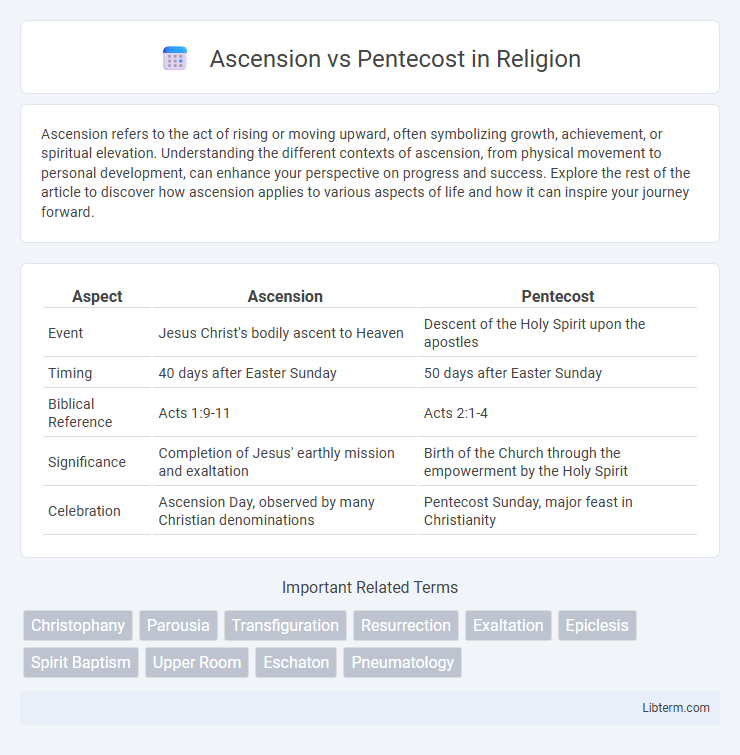Ascension refers to the act of rising or moving upward, often symbolizing growth, achievement, or spiritual elevation. Understanding the different contexts of ascension, from physical movement to personal development, can enhance your perspective on progress and success. Explore the rest of the article to discover how ascension applies to various aspects of life and how it can inspire your journey forward.
Table of Comparison
| Aspect | Ascension | Pentecost |
|---|---|---|
| Event | Jesus Christ's bodily ascent to Heaven | Descent of the Holy Spirit upon the apostles |
| Timing | 40 days after Easter Sunday | 50 days after Easter Sunday |
| Biblical Reference | Acts 1:9-11 | Acts 2:1-4 |
| Significance | Completion of Jesus' earthly mission and exaltation | Birth of the Church through the empowerment by the Holy Spirit |
| Celebration | Ascension Day, observed by many Christian denominations | Pentecost Sunday, major feast in Christianity |
Understanding Ascension and Pentecost
Ascension marks the moment Jesus Christ physically rose to heaven 40 days after His resurrection, signifying the completion of His earthly mission and His exaltation. Pentecost occurs 50 days after the resurrection, when the Holy Spirit descended upon the apostles, empowering them to spread the Gospel and inaugurate the Church's mission. Understanding Ascension highlights Christ's return to divine authority, while Pentecost emphasizes the spiritual empowerment and the birth of Christian ministry.
Biblical Accounts of Ascension
The Biblical accounts of the Ascension are primarily found in Luke 24:50-53 and Acts 1:9-11, where Jesus is described as being taken up to heaven forty days after His resurrection. This event signifies the completion of His earthly ministry and the beginning of His heavenly reign at the right hand of God. Unlike Pentecost, which marks the outpouring of the Holy Spirit (Acts 2), the Ascension emphasizes Christ's exaltation and the promise of His return.
The Significance of Pentecost in Christianity
Pentecost marks the descent of the Holy Spirit upon the apostles, symbolizing the birth of the Christian Church and empowering believers for ministry and witness. Its significance in Christianity lies in the fulfillment of Jesus' promise to send a Helper, establishing the foundation for global evangelism and spiritual transformation. This event is celebrated as the moment when the apostles were equipped to spread the gospel, uniting diverse peoples through the Spirit's manifestation.
Key Differences Between Ascension and Pentecost
Ascension marks the event when Jesus Christ physically rose to heaven 40 days after His resurrection, symbolizing the completion of His earthly ministry. Pentecost occurs 50 days after Easter and commemorates the descent of the Holy Spirit upon the apostles, empowering them to spread the Christian faith. The key difference lies in Ascension emphasizing Jesus' departure and exaltation, while Pentecost celebrates the beginning of the Church's mission through the Holy Spirit's arrival.
Spiritual Meaning of Ascension
The Ascension signifies Christ's return to Heaven, symbolizing the completion of His earthly mission and His exaltation as Lord over all, which inspires believers to live with hope and purpose. It represents the spiritual transition from Christ's physical presence to His ongoing spiritual presence through the Holy Spirit. This event encourages Christians to embrace a life of faith, trust in divine guidance, and anticipate the future resurrection and eternal life promised by Christ.
The Role of the Holy Spirit at Pentecost
The Role of the Holy Spirit at Pentecost marked a pivotal moment where the disciples received divine empowerment to spread the Gospel, enabling the birth of the early Church. This event fulfilled Jesus' promise of the Comforter, who would guide believers into all truth and equip them with spiritual gifts for ministry. The outpouring of the Holy Spirit manifested in tongues of fire and audible sound, symbolizing a new era of divine presence and active participation in God's mission.
Celebrating Ascension: Traditions and Practices
Celebrating Ascension involves various Christian traditions such as attending special church services that commemorate Jesus Christ's 40-day journey to heaven, often marked by the reading of scripture and hymns specific to the event. In many regions, processions and outdoor gatherings symbolizing Jesus' ascension into the sky are common, reflecting the spiritual significance of the event. Traditional Ascension Day practices include the blessing of fields and homes, representing hope for divine protection and blessings throughout the year.
How Pentecost Shapes Christian Faith
Pentecost, celebrated fifty days after Easter, signifies the descent of the Holy Spirit upon the apostles, empowering them for missionary work and establishing the foundation of the Christian Church. This event fulfills Jesus' promise of the Holy Spirit as a guide, catalyst for spiritual renewal, and source of divine inspiration, deeply influencing Christian worship and theology. The transformative experience at Pentecost shapes Christian faith by emphasizing the ongoing presence of the Holy Spirit in believers' lives, fostering unity, and encouraging active participation in the spread of the Gospel.
Theological Implications of Ascension and Pentecost
The Ascension signifies Christ's exaltation and the completion of His earthly mission, affirming His divine authority and the promise of the Holy Spirit's coming. Pentecost marks the outpouring of the Holy Spirit, empowering the apostles to begin the Church's mission and fulfill the Great Commission. Theologically, Ascension emphasizes Christ's sovereignty and heavenly intercession, while Pentecost highlights the Spirit's role in sanctification and the active presence of God within the community of believers.
Ascension vs Pentecost: Lasting Impact on Christianity
The Ascension marks Jesus Christ's physical departure to heaven, symbolizing the completion of His earthly ministry and the promise of the Holy Spirit's arrival. Pentecost, occurring fifty days later, signifies the Holy Spirit's descent upon the apostles, empowering the early Church with spiritual gifts and inspiring global evangelism. Together, these events form the foundation of Christian doctrine and Church mission, emphasizing divine authority and ongoing spiritual renewal.
Ascension Infographic

 libterm.com
libterm.com